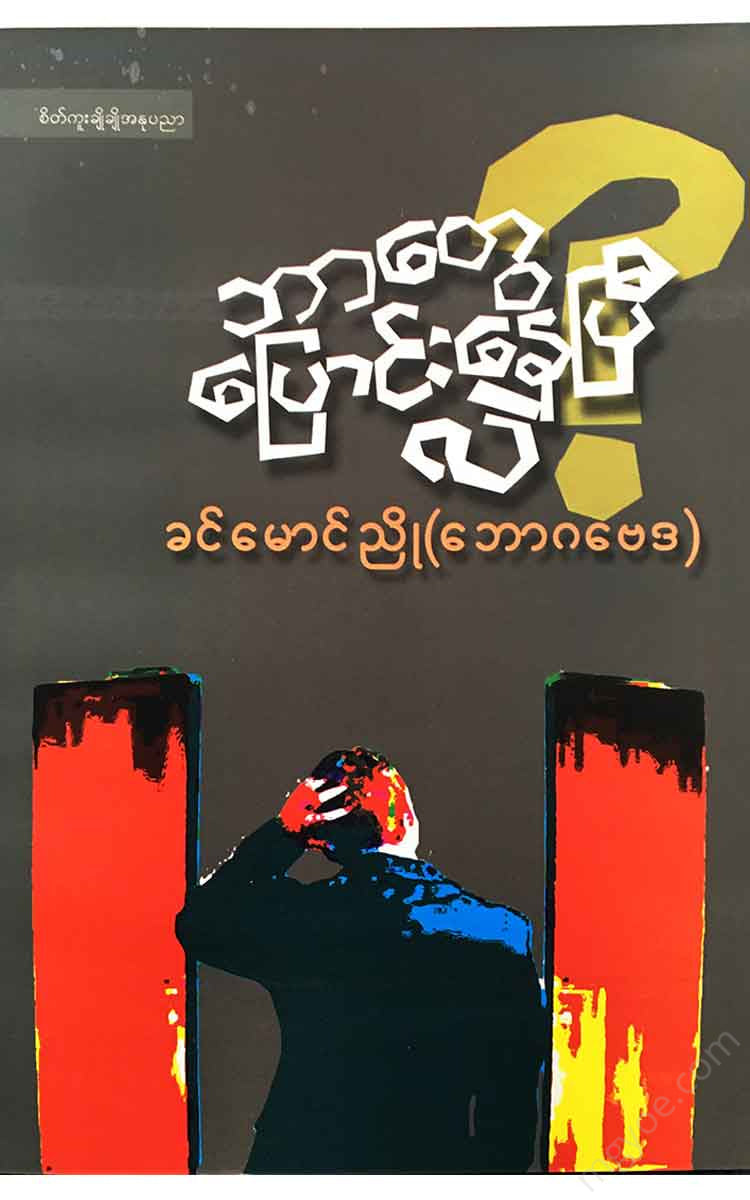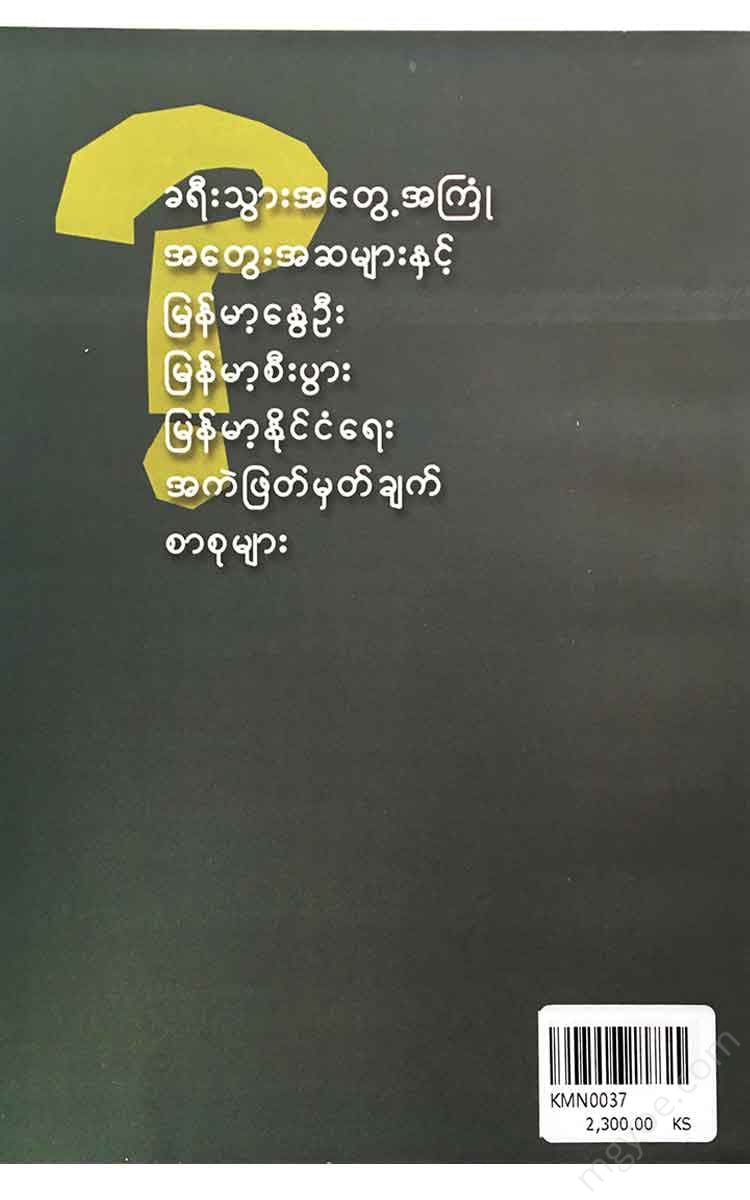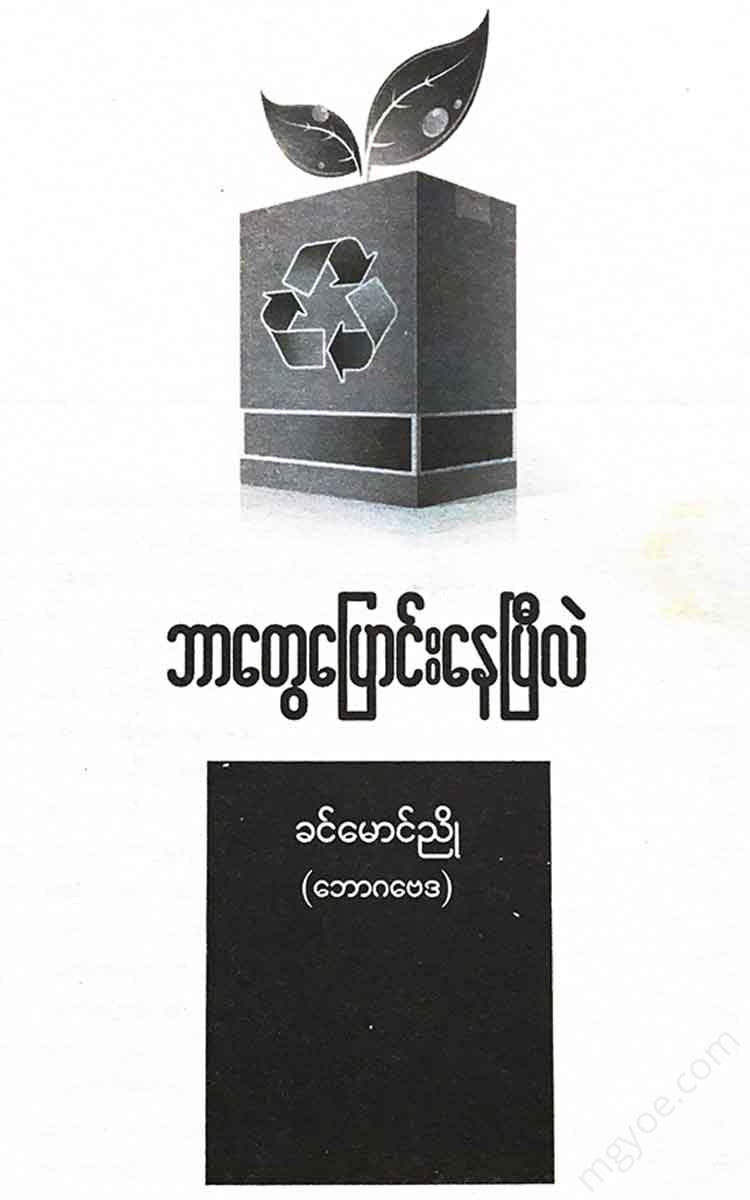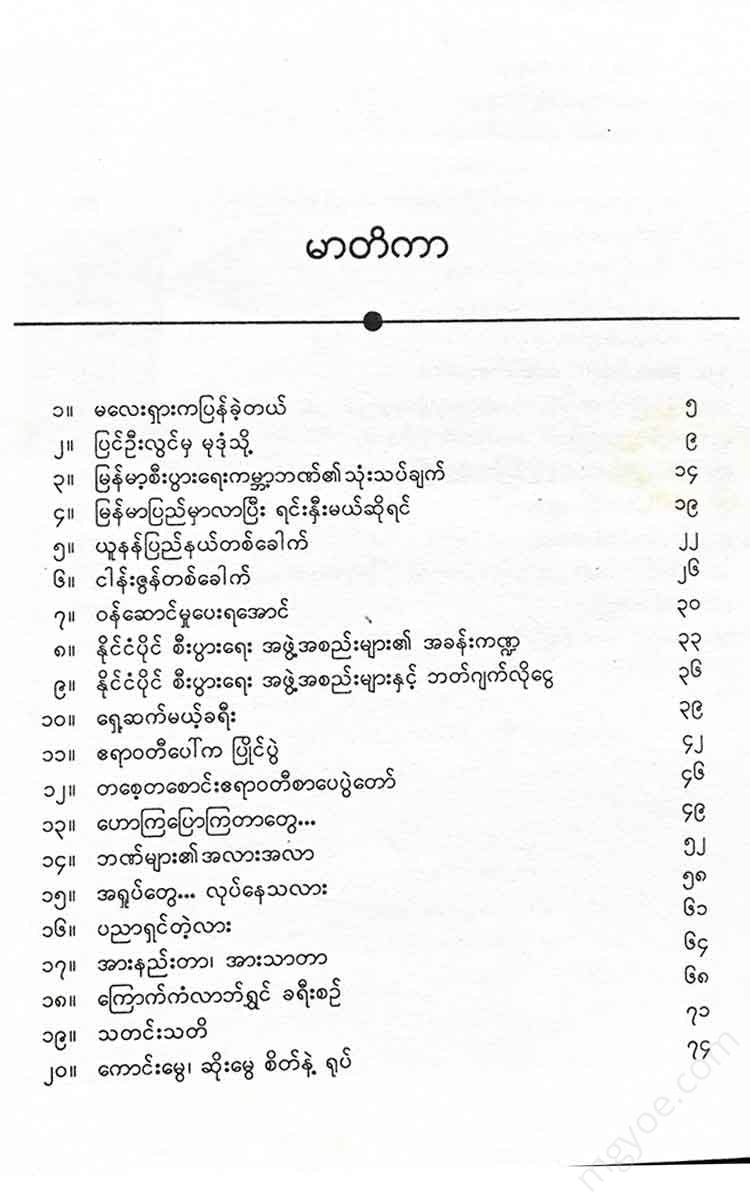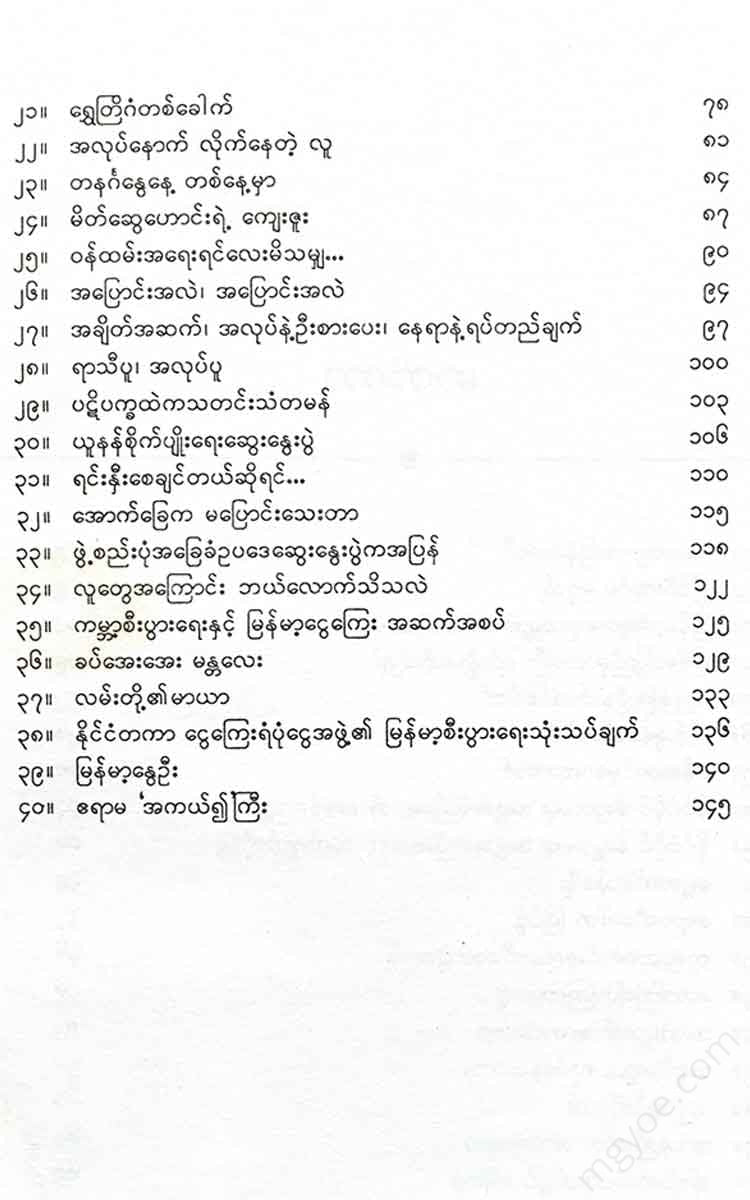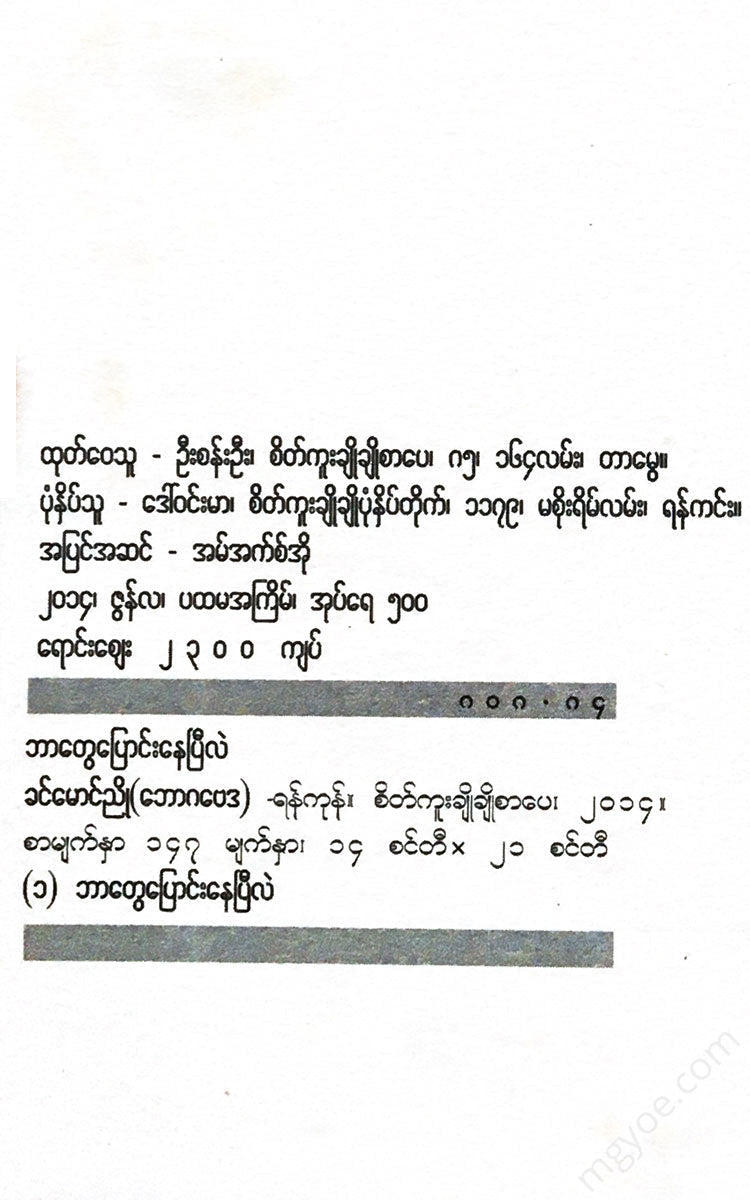စိတ်ကူးချိုချိုစာပေ
Khin Maung Nyo (Economics) - What has changed?
Khin Maung Nyo (Economics) - What has changed?
Couldn't load pickup availability
I returned from Malaysia.
Six years ago, I accidentally missed the departure of my Thai flight at Yangon Airport. One reason was that the departure hall for domestic flights had been changed to the Thai departure hall. Another reason was that I felt the longing of the children and families who were going to work in Malaysia. Now I have a chance to see the beginning, middle, and end of that longing story.
I was invited to a literary lecture in Malaysia and accepted it as soon as it was available. They had arranged everything for me, including visas and tickets. I started seeing groups of children going to work at Yangon airport. I took a little money with me for my own use and a few dollars to show if necessary, but no one asked for it from the airline, Myanmar immigration, or Malaysian immigration.
When I entered Kuala Lumpur Airport in Malaysia, I was not allowed to fill out a visa application on the plane. So I asked the people around me if I was sleeping and they also did not allow me to fill it out. I took the train to the arrivals counter and immigration counter at the airport. The children were checked separately, shouting at each other. The rest of the people did not have to fill out any visa application form. They just scanned my passport, took my two fingers and fingerprints and allowed me to enter the country. I was worried about how they would fill out the address I used to fill out on the plane, but it was useless.
My Burmese friends met me at the airport. They gave me some money for small expenses before I arrived. They welcomed me with coffee and cakes. I was afraid that I would be left behind and wanted to use the internet, so I tried to get a phone SIM card, but I ended up going to Jeollanam-do.
When we landed in Malaysia, we first saw the palm oil plantations from the plane. Although I have been to other neighboring countries, this was my first time in Malaysia, so from what I saw, Malaysia, which is always rainy, is hot but lush. We left Kuala Lumpur Airport, Malaysia, for Johor, which is about 300 kilometers away, without entering the city, by three cars.
At first glance, I thought it was a Westernized country like Singapore. I saw some magnificent mosques. They also set up small places for people to pray at roadside stops. While I was giving a sermon in Jeollabuk-do, I could hear the sound of people praying. When I gave a sermon at the Kuala Lumpur China Hall, thousands of Burmese people attended. It was my first time giving a sermon in a town on the border with Singapore, Jeollabuk-do, so the audience was small. The local businessmen were very hospitable, but I couldn’t go anywhere because I didn’t have much time.
It was almost Christmas Eve and the hotels were all full. There was a long line for breakfast, but by Monday morning, I think everyone was gone. It was pretty clear. You didn't even see the double-decker buses that were usually full in front of the hotels.
Even in front of the hotel, you can see Burmese signs and Burmese signs. There is a monastery in Johor, and there are about sixty Burmese monasteries in Malaysia. You can imagine that there is a strong Burmese audience in Malaysia. In Kuala Lumpur, near the bus station, there is even a street lined with Burmese shops.
I don’t know how many Burmese people come and go. Sayar Kyaw Yin Myint, who is known as the “Master of the Road,” is constantly answering the phone at Kotoni’s travel agency, and there are people who want to go back and people who want to come. Sayar Kyaw Yin Myint listened to him preach all the way to Jeolla. On the way back, we surrounded him and interviewed him. His parents are no longer in Burma, and he is settled in Kuala Lumpur with his family. When he last returned to Burma, he visited the powerful Buddhas and prayed that he would never return to Burma. So far, his prayer seems to have been fulfilled. Some Burmese in Malaysia also said that they would return when the rains stopped, but Malaysia never stops raining.
There are those who don’t want to go back but are allowed to. At Kuala Lumpur Airport, the birthday girl, Myanadi, accompanied me. She sat down and kicked the three teachers. After she kicked the immigration counter, they came in. There were two children lined up next to her. There were some girls. When I looked carefully, they were handcuffed. Oh.. there were nine children who were being sent back. Then, like me, U Pyin Sin, who was returning from Malaysia, realized that they were Burmese because they were holding Myanmar passports in their hands. I saw them being sent back in two batches in the departure hall. Teacher Ma Sandar said to feed the children without eating the food they were supposed to eat on the plane, so she also gave me her own lunch box. I spent about a month in a Malaysian prison. I had heard that the food was enough for two meals, but I didn’t want to hear much, and I couldn’t ask any further.
I will summarize what I said at the Chulalongkorn University seminar in Thailand. I just want to go back to my home. My home is poverty, wealth, and happiness. I can go back to poverty or happiness at any time. I can go back in any way. I can understand that you can't live happily, you can live comfortably. We are working together to make you live happily. When you live comfortably, you can live happily, you can live comfortably. Not only did you bring back money, but you also brought ideas, experiences, knowledge, technology, and wisdom. I also said that you should make money jump out of Malaysian pockets. Many businesses seem to be dedicated to Burmese workers, and some businesses are headed to Malaysia. There are some people who are working in construction. I have also met some Burmese experts in Malaysia. I also saw Burmese people in the hotel and in the restaurant next to the hotel.
The Xu
When we arrived, we heard that the Burmese people were gathering, working, and trying hard. They had to work extra hard to come to the lecture and try to find time, so we paid attention and tried to make the time worth it.
From Pyin Oo Lwin to Mudon
(1)
When you travel a lot, it can be difficult to keep track of every trip and start over. It's been a while since I've kept a daily journal. I also cleared out the years of journaling when I moved house.
In December, I attended a camp and reunion organized by the Myanmar Buddhist monk, the Asian Light Monastery, near Pyin Oo Lwin. I went to meet my former students and trainees, but they were not all able to come because of their own responsibilities, and I don’t remember them very well. The Burmese faith is that the school, which is about two miles from the road, is full of schools. In the school that is located, I found not only hot and cold water, but also a rock garden. It seems that the monks and nuns also came at the same time. The monk does both Vipassana and Charitable Meditation, and his view of the times seems to be quite strong.
After giving a lecture in Pyin Oo Lwin, I came to Thailand again. I have already written about this. When I returned from Thailand, I went to the Asariyya offering ceremony at the Economics University. I am not yet 60 years old. This time, at the Asariyya offering ceremony, my class and I gathered, and there were programs for donating, and there was a meeting table and music at night, and then the Kankawsaung and Saraphisaung met with their own programs, so I was tired of saying goodbye. And I couldn’t finish talking, and I had to greet this person, and this person came in and greeted each other, and I didn’t know who they were, and there were many people I didn’t see. I didn’t even go to the donation pavilions on the Inya Lake side of the Economics University. I only set foot in the Nilar Yathu Hall where the Kanto ceremony was held. There were so many people that even the teachers had difficulty getting in and out. Many of them couldn’t come to the dinner. They are not young anymore.
On the day of the Asriya offering, my daughter and her friends happily made a birthday offering at home. She was tired all day, but she was happy.
( 2 )
A former student from Mudon who came to the Economics University's Asriya offering ceremony came to give a lecture at their Mudon, so I nodded without thinking twice. It had been quite a while since I had been there. I went with him once on the way back from the Asriya offering ceremony.
We had not reached Kyaikto, which is where Kyaikthiyo is located, for a while. The road from Kyaikto to the other side was also good. We had lunch in Wau and continued our journey. In the evening, we reached Mawlamyine. Before having dinner on the banks of Mawlamyine, we enjoyed the beauty of the sunset over the Thanlwin River and Mount Sinraw, took some photos, and then had dinner. After dinner, we continued our journey to Mudon because it was dark and we couldn’t see much. On the road, we often saw vans that seemed to be carrying goods from the border.
When I arrived in Mudon, I couldn’t even take a shower. I had to sleep on the floor. I had brought a bag full of warm clothes, but the weather was not as cold as in Yangon. I tried to upload photos I took in Mawlamyine, but the CDMA internet worked fine. But when I arrived in Mudon, the CDMA didn’t work. I wasn’t sure if I could use a phone, it took half an hour to upload a single photo. But luckily, I could open Gmail, so I could send, reply, and send messages. I learned about the plane crash on Facebook in Kyawkham and Sesei.
On Christmas Day, I saw alms-giving in Mudon, monks opening their houses to serve alms, and guests being invited. The children in front of the house were taking the precepts early, playing, and studying, and I could hear the sounds of early blessings. I also had the opportunity to visit the first monk of Mudon, Mingun Jetawan, because of the picture I saw on the car.
I have almost forgotten what Mudon is, but I still received a Mudon blanket as a gift. All I could see were mountains, only rubber trees called Shwe Phyu. I saw in Mudon Magazine that Mudon used to have a habit of making reserves for agriculture and weaving, and later for agriculture and rubber. I wondered if Mudon people do the same now. I also wondered what else they make reserves for besides rubber. The reason is that in the past, they were able to produce a high percentage of high-grade rubber, but now they are selling it to countries that buy low-grade rubber.
